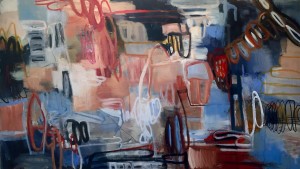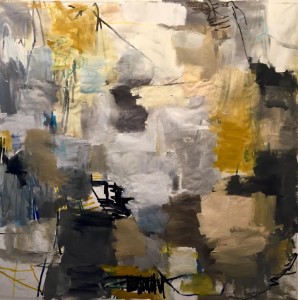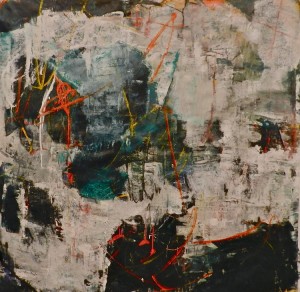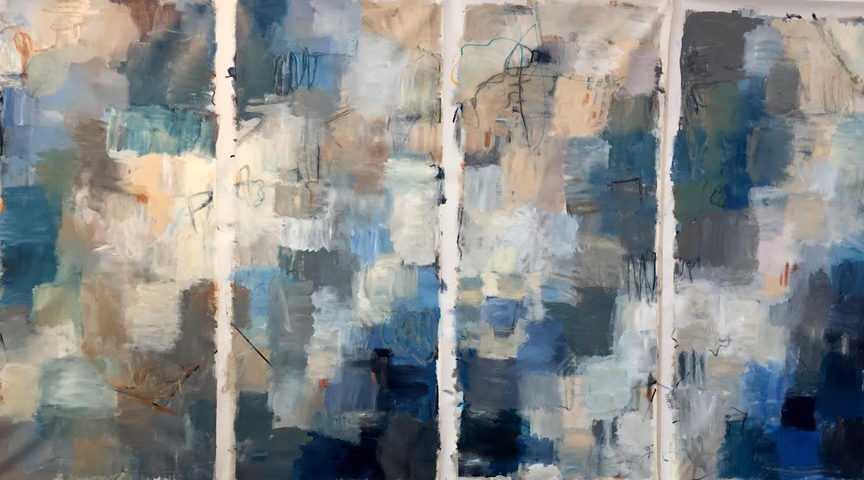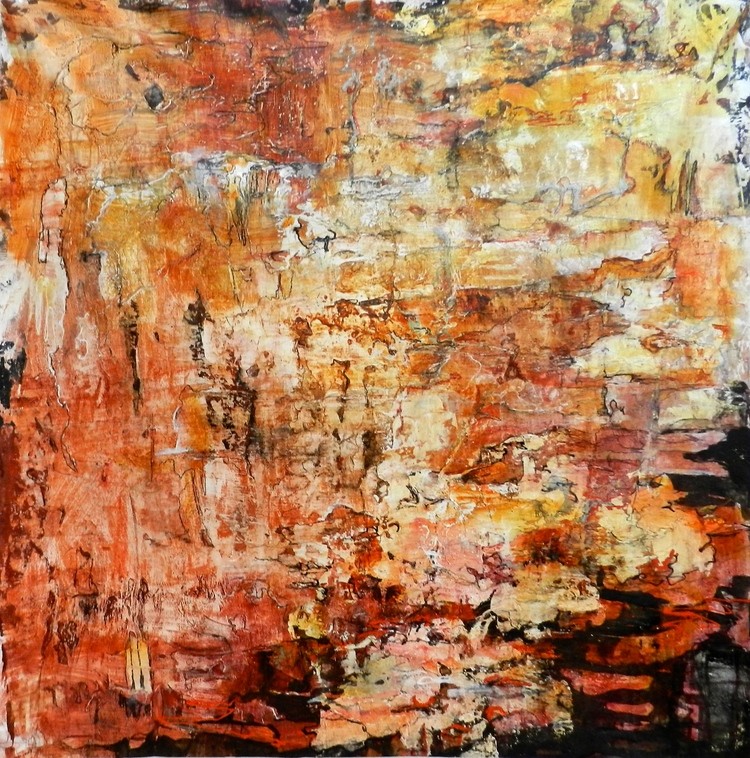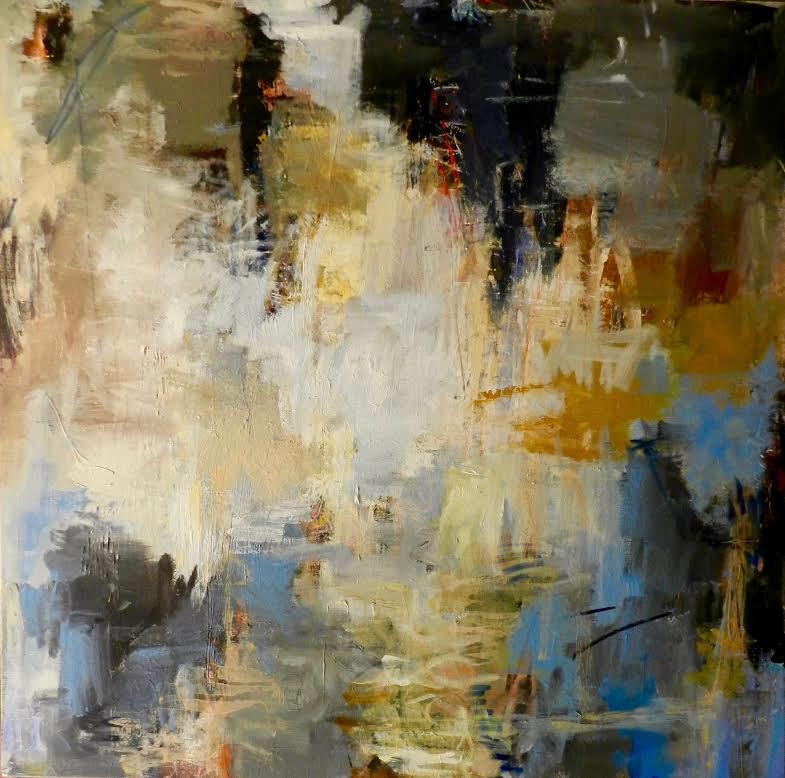
“Slipping On Chippewa Street” by Pat Zalisko, 48″ x 88″, acrylic, mixed media on canvas
It was after midnight when they admitted my old man. He was in the hospital bed closest to the door. A curtain partitioned the room even though the window side was empty. They had raised the bed, propping my dad at an angle to make it easier for him to breathe. Oxygen tubes were tucked in his nostrils and every few minutes he’d touch them with his fingertips. His eyebrows would arch when he felt the plastic as if discovering the tubes for the first time. Outside, a relentless February wind howled.
“How far did we drive tonight in this weather, Johnny-Boy?” my Dad asked, his voice soft, tired.
I shifted my weight from one foot to the other as I stood by his bed. Buffalo General was a mile-and-a-half ambulance ride from his house. “We didn’t drive anywhere, Pop. You’re in the hospital.”
He touched the oxygen tubes, raised his eyebrows. Surprised.
A monitor was clipped to his fingertip; sensors were taped to his chest. He couldn’t have weighed more than a hundred and thirty pounds—a buck thirty he would have said—almost a featherweight. A screen mounted above his bed displayed his vitals—oxygen level, blood pressure, heart rate. All low numbers.
“How come you picked such a crappy hotel, Johnny-Boy? I got money.”
I smoothed his white hair into place. “We’re still in town, Pop. You’re in Buffalo General.”
Finger tips. Oxygen tubes. Eyebrows.
The hospital gown hung loose on him. The broad shoulders were gone, his thick chest a memory. His skin was almost translucent, the back of his hand already bruising where they had inserted the IV port. It was hard to believe this was the same man who had once thrown Jimmy Slattery, the former lightweight champion of the world, Buffalo’s greatest boxer, out of his restaurant. He had bum-rushed him by his collar and belt, tossing him out on Genesee Street, and watched him belly slide across the icy sidewalk to the curb. Slattery’s drinking buddies, other once-dangerous men with flattened noses and cauliflower ears, had yelled at my old man, saying he can’t treat the champ that way, that he should show him more respect. My old man had yelled back in Greek, cursing them and their Irish mothers, and went back to his grill. This was after the war when my old man was hard and lean from marching across Europe with Patton and Slattery was a drunk, his fighting days long gone, just another bum who bothered waitresses late at night.
It was one of my father’s favorite stories to tell back when he still told stories. If there were others listening around his age—my uncles, my mother, all gone now—they would add their own Jimmy Slattery story: how he had danced on his toes and fought with his hands down decades before anyone had heard of Cassius Clay; how he would have filled out and taken Dempsey’s heavyweight crown if it wasn’t for the bottle; how handsome he was with his dark hair and crooked Irish smile.
A nurse came in then. She was pretty with caramel skin that contrasted with her light blue scrubs. Her dark eyes were tired from a long shift but still flashed when she smiled and asked my father how he was feeling. She had a sweet face with soft features and deep dimples, the kind of face you wanted to see while propped in a hospital bed, while propped in any bed.
“What’s the maid doing in our room so late at night, Johnny-Boy?” my Dad asked. “I didn’t call her.”
“Pop,” I said, hushing him, and then apologized to the nurse.
“That’s all right,” she said, her lips pressing into something like a smile. The light in her eyes faded, the dimples disappeared. “Everybody’s tired. You should go home before the weather gets worse. Get some rest. Let him sleep.”
I nodded. I had calls to make in the morning: to the priest; to my sisters spread across the east coast, telling them to come home despite the storm; to Debbie, my ex-wife, living a thousand miles away on the other side of town.
“I got to go, Pop. I’ll see you in the morning.” I bent to kiss his head.
“You get your own room?” he asked. “You next door?”
I looked down into his eyes, pink rimmed and watery, a new vacancy seeping into the irises. I kissed his head again. “Yeah, Pop. Right next door.”
I didn’t go home.
I found myself skidding down Chippewa Street, the roads icing from sleet. I slowed to a creep as I passed the bars: Bada Bing, Bacchus, Bottoms Up, their neon calling me. Seven hundred and eighty-six days had passed since I last had a drink, the same number of days since Debbie had left me, as if sobriety would show her I had become a changed man, a better man, someone worth returning to. My tongue rolled thick and heavy in my mouth. I took my hand off the wheel and curled my fingers as if a lowball glass was already snug in my grip, smooth and cold against my palm. I could almost hear the ice cubes rattle.
I needed to call my sponsor.
I pulled to the curb in front of where the House O’Quinn, Slattery’s favorite bar, had once stood. Katie, the last bartender there before it was sold and gutted and transformed into a trendy Italian bistro, had told me about Slattery’s ghost—how the cleaning crew and day manager had all claimed catching a glimpse of the prizefighter hunched at the end of the bar only to have him disappear when they turned to look dead-on. Or how customers who sat on his old stool would complain of an icy chill and ask her to turn down the air conditioning. She told me other stories, too, ones she heard from cops and cab drivers and early-morning deliverymen, all swearing they saw Slattery’s ghost staggering down Chippewa Street with his arms outstretched like an aerialist trying to keep balance.
I didn’t call my sponsor.
I called Debbie and listened to her recorded message assuring me she was sorry she’d missed my call, that my call was important to her, that I should leave a message at the tone. I hung up and wondered if she didn’t answer because someone was lying next to her or if she was just long past taking middle-of-the-night calls from me. As I slipped the phone into my pocket and swung from the car, my breath fogging the frigid air, I made promises: I’d only have three drinks, only beer, I would not call Debbie again.
I went inside and ordered Scotch.
The new owners had kept the old oak bar with the brass foot rail that ran along the east wall. That may have been the only thing that Slattery would have recognized if he still haunted the building. Pine floors had been ripped out and replaced with laminate that looked like wood. The natural wainscoting and doorframes had been painted over with a black matte to match the new high-back bar stools. Light fixtures of the same dull color had replaced the original brass ones and were suspended from the faux tin ceiling. Tables in the darkened dining room were covered with white tablecloths; a vase centered on each held a single red rose. I wondered if patrons still felt a chill when they sat at the far end facing the entrance or if that had ended when Slattery’s barstool was hauled away with the heart pine floor and everything else they had torn from the place.
“The kitchen’s closed,” the bartender said, setting the Scotch on a cocktail napkin in front of me. He was short and stocky with mean, narrow eyes and didn’t look like he smiled much.
I nodded.
“And this is last call.” He said it like a threat as if he was looking forward to throwing me out by my collar and belt and locking the door behind me. There was no one else in the place. “Drink up.”
I nodded again, certain other bars on Chippewa closed later.
A flat-screen TV was mounted between two tiered shelves lined with bottles behind the bar, the shelving painted the same dismal matte. A basketball game from the west coast flickered without sound and I imagined squeaking sneakers and the leather-against-wood dribbling ball. I looked everywhere—at the bottles, the ball game, out the front window onto frozen Chippewa Street—everywhere but at the glass in front of me. The Scotch remained untouched but I could feel the rim touching my lips, the whiskey’s first bite, the heat in my throat, then my belly, then spreading through me, melting everything. If I take that drink, my eyes will close and when they reopen the world will have reverted to the way it had been seven hundred and eighty-seven days ago. Time travel, I thought.
Magic.
A man about my age, maybe older, entered the bar and cold air rushed in with him before he shut the door. The temperature must have dropped as the sleet had turned to snow. His cheeks were pink from the wind and dark circles bagged under his eyes. He pulled off his wool watch cap and his static hair stood at angles. I turned back to the bottles, to the ballgame, to the shelves.
“Last call,” the bartender snapped, angry, I guess, that another customer had wandered in when he wanted to cash out for the night. “We’re closing soon.”
The man stomped snow from his boots and headed to the end of the bar without answering. He must have lost his balance when he passed because he bumped my shoulder and muttered an apology; I would have spilled my drink if I had been holding it, the amber staining my jacket cuff, a waste of precious drops. He, too, ordered Scotch.
I felt the man staring at me, studying me, but I didn’t turn. The last thing I wanted was to talk. Then the phone was in my hand and I pressed redial and heard Debbie’s voice thanking me again for my call.
“Slipping?” the man at the end of the bar asked.
Now I had to turn. “What?” I set the phone next to my glass, wondering which I’d pick up next.
“You slipping?” he asked again.
“I don’t know what you mean, friend.”
He didn’t wait after the bartender slid his drink to him; he picked up his glass and drained half in a single gulp. I swallowed hard watching him, my Scotch still filled to the brim in front of me. I felt so tired then, as if weariness, thick and heavy, was sludging through every vein. I tried to remember the last time I had slept. My old man, so unsteady on his feet and confused, had been getting up every hour to use the bathroom, and I’d gotten up with him to hold him upright, to make sure he got back to bed without falling, to change him and mop the floor tile if he didn’t make it in time. This had gone on for weeks. My eyes burned as if all the moisture had been seared off days ago.
“I know you,” the man at the end of the bar said, and wiped his mouth with the back of his hand. One eye squinted as if steadying me into focus. “I know you.”
“Oh, yeah?” I said, and it was my turn to study him. His cheeks and nose weren’t reddened from the weather. Broken blood vessels mapped across his face. The lowball glass shook in his hand as he set it down. “From where?”
“Saint John’s Grace,” he said, nodding, certain. “From the meetings in the basement.”
I didn’t recognize him, but I hadn’t been to a meeting since my old man had started to fail. Maybe he did look familiar, one of those guys who stood in front of the old church on Lafayette Avenue smoking cigarettes and drinking thin, Episcopalian coffee during breaks. I don’t remember him getting up and telling his story: how he had awakened parked on railroad tracks, or in a different city, or in the back of a police cruiser covered in blood. Or hearing of his broken marriages, or broken children, or lost jobs, the same sad stories we all told. No memories surfaced of him confessing to the lies he had whispered to himself or others, or the violence he inflicted on those he said he loved. Still, he may have been one of the guys in front of Saint John’s Grace, hunched to the wind, talking about anything—football, movies, the weather—anything except how much he wanted a goddamn drink.
“You slipping?” I asked.
“No,” he snorted, and lifted his glass in a wretched toast. “Way past that, brother.”
He finished his drink and his body shuddered as if a door somewhere behind him had opened letting in the icy wind. I reached out, my hand hovering above my glass ready to snatch it but grabbed my phone instead and checked for missed calls, certain I had shut off the ringer at the hospital. The phone was on, the volume set to maximum. There were no messages. I set the phone down, the screen facing me, just in case.
The man tapped his empty glass against the bar to get the bartender’s attention. “Another,” he said.
“I already called it,” the bartender answered, his voice sharp. “That was the last one.”
The man tapped his glass louder. “Another.”
“Look,” the bartender said, his voice rising as he walked towards him. His face and slit-narrow eyes darkened. “I told you it was last call when you came in. Last call means last call. If you’re done, leave.”
Bastard.
The man showed him his empty glass as if it was piece of crucial, convincing evidence. “Another.”
The bastard reached under the bar and pulled out an old wooden billy club, something I hadn’t seen since my old man had sold his restaurant. He, too, had kept one under the counter for late-night customers who wouldn’t listen. The nightstick even looked like my Dad’s with the same ribbed handle and brown leather strap. The new owners must have found it under the bar and kept it. It’d probably been hanging there since Slattery spent his days at the House O’Quinn drinking to forget all he had lost and what little remained for him to lose.
The bartender slapped the baton against his palm—wood against skin, wood against bone. “Get out.”
“I just want another drink,” the man said. “This is a bar, isn’t it?”
“I said get out. I’m not telling you again.”
“Get me a drink. It’s your job.”
The bartender smashed the billy club against the oak-top, the sound cracking across the empty restaurant as if it had come down across skull. The man jerked backwards almost tipping his stool.
“Hey.” I grabbed my Scotch and slid to my feet. “It’s all right. He can have mine. I don’t need it.” A memory flashed of me as a teenager and my old man lecturing me on the difference between a want and a need. I set the drink next to the man’s empty glass. “Everything’s fine.”
The bartender pointed the nightstick at the man. “Finish it and get out.” He aimed the billy at me. “You, too.”
I raised my hands showing him my empty palms, surrendering, proving there was nothing up my sleeves.
“You’re a good man,” the drunk said, and reached for my drink. Debbie would have differed.
I pulled some crumpled bills from my pocket to pay for the round and a white chip fell to the floor. My sobriety chip, the Desire coin, the one they give you for being sober for that first awful twenty-four hours. I bent to pick it up before it rolled away. I had other chips at home—silver, red, blue—thirty days, ninety, a year, but I only carried the white one with me.
The bartender stood across the bar from us, the billy club in his fist, waiting for the man to finish the Scotch. I zipped my jacket; the prick must have already turned down the thermostat for the night. I watched the man down the drink, glad I had given it to him, wishing I hadn’t, my guilt increasing every time he swallowed. The bartender snatched the empty glass as soon as the man set it back on the cocktail napkin and pointed to the door with the nightstick.
“Get out,” he said.
The man grabbed my arm and steadied himself as he slid off the barstool. He wavered a moment and took a deep breath before releasing my sleeve. I didn’t say anything to the bartender when I left—there was nothing to say—and only slowed to scoop my phone from the bar; I hadn’t missed any calls.
Outside the wind drove the snow at a slant into our faces, my cheeks pelted by tiny bits of ice. I turned from the wind. Chippewa was already covered in white—the sidewalks, the icy street, the parked cars—giving the false impression of purity, of cleansing, of grace. I shoved my hands in my pants pockets, the chip, the same color as the snow, tight in my grip.
“I’m going to Bacchus,” the man said, slurring a bit, and nodded across the street to the cream terra cotta building that probably hadn’t changed much since Slattery had haunted Chippewa and the bar there had been called The Calumet Club. “You coming?”
“No,” I said, squeezing the chip in my pocket so tightly I’m sure it left an impression. “Early day tomorrow.”
The man nodded, turned and stepped into the street just as a car was turning left onto Chippewa from Franklin. The driver, startled that the man had stepped from the curb, slammed his brakes but the ice beneath the snow stole the tires’ grip and he skidded toward the man. I grabbed the man by the collar and jerked him back to the sidewalk as the driver fishtailed passed. It happened so fast. I saw it in slow motion.
The man turned to me breathless and smiled showing no teeth, no light in his eyes. “You saved me,” he said, then crossed the street without looking either way again.
I hadn’t saved anything—not him, not my father, not my marriage. I gripped my white chip and headed to my car.
The next morning, I called the priest and my sisters; Debbie still wasn’t answering. I brushed snow off my car and chiseled ice from the windshield. At the hospital, I signed forms—Medicare, HIPAA, Do Not Resuscitate. A different nurse, ginger-haired and freckled, maybe a year out of nursing school, told me they would soon be moving a new patient into the window-side bed. It didn’t matter. I had spoken to the doctor. They were transferring my father to the Hospice floor that morning.
I opened the curtain that partitioned the two sides and let sunlight flood the entire room, hoping it would warm my old man. I moved to the window still holding the white Styrofoam cup of thin, now cold coffee and looked down on the city. Brilliant sunshine reflected off snow-covered roofs, the sky a cloudless blue backdrop, the storm having moved off to the east. From twelve floors up I could follow Delaware Avenue past Chippewa, past Lafayette Avenue and Saint John’s Grace, and guess which was my father’s street, but I was facing the wrong direction and Debbie’s new neighborhood, new life, was far from view.
Movement flashed from the corner of my eye and I turned toward the hospital bed. My father, eyes still closed and somewhere beyond sleep, had stretched his arms to his sides like airplane wings as if he was about to take flight and was waiting for the wind to lift him. Or maybe he was dreaming of the old days, of his restaurant, of The Calumet Club and The House O’ Quinn, of Slattery’s ghost weaving down Chippewa Street like a drunken aerialist, reminding us in his own way to keep our balance, to steady ourselves, to try not to fall.
Stephen G. Eoannou is the author of Muscle Cars, a short story collection published by The Santa Fe Writers Project. Stories have appeared in Best Short Stories from the Saturday Evening Post Great American Fiction Contest (2013 & 2014), The MacGuffin, Hayden’s Ferry Review, and have been honored with two Pushcart nominations. He holds an MFA in Creative Writing from Queens University of Charlotte and an MA in English from Miami University. He currently lives in his hometown of Buffalo, New York.
Read an interview with Stephen here.







